You are using an out of date browser. It may not display this or other websites correctly.
You should upgrade or use an alternative browser.
You should upgrade or use an alternative browser.
TAI TF-X / Milli Muharip Uçak MMU Kaan
- Thread starter ocay
- Start date
Yes, Russia as an alternate source seems obvious, but if the stumbling block is tech transfer, I doubt they will offer what Turkey is looking for either. Case in point, there are contentious issues regarding the degree of tech transfer and/or licensed production under the S-400 deal too, AFAIK.
Why not just go to Russia/China for engines? After the s400 deal, engines shouldnt be an issue.
While the reasons (or "issues") are too many to mention here in any meaningful way, I doubt even Erdoğan in his current position suffers from enough hubris to not hedge his authoritarian bets somewhat. The S-400 deal itself continues to be a whole morass of a debacle and the system's usefulness to Turkey, given the most likely actual conflicts in the area, is dubious at best. While "problematic" is somewhat of an understatement of Turkey's role in NATO at the moment, they still are a member after all.
- Joined
- 29 November 2010
- Messages
- 1,727
- Reaction score
- 3,336
what are the options right now?
M88 - Probably unlikely. France and Turkey are on opposing sides in regards to the Med dispute and France is very pro Greece
F414/404 - Unsure. I thought it was the leading candidate but there's been a rift in regards to the S-400 system. not sure if its enough to stop the export of jet engines
EJ200 - assuming its the UK, Italy and Germany that can control its export. UK seems still friendly to Turkey. Italy is on the same side with Turkey on the Med disputes. Germany may oppose
RD-93 - I think the Russians are willing to export, but do the Turks want this engine?
WS-11 and WS-13 - would this be the first time Turkey imports anything from the PRC?
M88 - Probably unlikely. France and Turkey are on opposing sides in regards to the Med dispute and France is very pro Greece
F414/404 - Unsure. I thought it was the leading candidate but there's been a rift in regards to the S-400 system. not sure if its enough to stop the export of jet engines
EJ200 - assuming its the UK, Italy and Germany that can control its export. UK seems still friendly to Turkey. Italy is on the same side with Turkey on the Med disputes. Germany may oppose
RD-93 - I think the Russians are willing to export, but do the Turks want this engine?
WS-11 and WS-13 - would this be the first time Turkey imports anything from the PRC?
- Joined
- 2 January 2006
- Messages
- 3,585
- Reaction score
- 3,454
Again, the main problem with this project is simply IMO that no-one wants to wish Turkey bad luck or anything bad, but that most international, reasonable and well respected analysts all have too many open questions and that so far too few of them are answered.
In return any such critical question, remark or doubt is always alone rated an insult and replied in a most aggressive way.
IMO a forum is exactly the place to exchange opinions, even contradicting ones, to ask open questions and to get answers and explanations. If one expects only expects "whao huu ... the best fighter yet to come!" and nothing more, shall leave a discussion.
Son in summary if you look at this program as an outsider we have two side, both as different as they can be:
On the one side - the official one: The TFX/MMU is is a most impressive fighter, a great design and on paper the fighter looks very promising.
On the other side several international analysts and me too have several grave concerns in regard to the overall timeline, budget and especially its engines. This is based on the one side on the "unique social and political situation" in Turkey, which I rate unsecured and even more based on the fact that besides what Turkish sources claim the officially agreed use of F110 engines were so far not announced by either the USA or GE.
This is in strict contrast to any other foreign use of GE engines, be that in India, South Korea and so on and given the latest - to put it mildly - political dispute between the USA and Turkey and the lack of any official US confirmation I am doubtful.
As such my biggest concern are the engines. At least by my understanding (and here I'm open for corrections) it is a fact, that even if a country assembles or manufactures a US engine it cannot simply use it in another product without permission. At least by my understanding, the USA are very strict on this.
So in summary: I would be very much more optimistic if anyone could share not a YouTube-video claiming "it is so" but a credible source telling something about the terms of conditions for GE F110 that Turkey signed. Any bashing down of questions is neither constructive nor helpful.
Even more such nationalistic, stupid claims like "we could even copy it and GE won't even care!" or "if they don't agree, we will go the Russian way!" is not a proof for the agreement to use a TEI built F110. Only the US government - not even GE and surely never TEI - decides on the use of US high end engines. Why alone noting this fact is rated an insult by some is beyond my understanding.
Again, such an agreement is maybe done, but why then does no US source and most of all GE mention this, which is most unusual since GE usually mentioned any use of their engines by a foreign partner?
As such: without any authorisation from the US government, there is NO F110 available for the TFX unless Turkey ignores the US intellectual properties which in return even worse consequences.
Therefore in short: My wish for any discussion on this type would be an honest, open minded and civilised discussion, but without these points of concerns solved (and these are not my concerns alone) all such claims the TFX prototype 01 will be being ready in 2022 and will fly in 2023 is far from assured regardless what some constantly claim.
Anyway, even if the engine issue for the prototypes is solved, there are still mismatches considering the TF-X's development timeline:
(via hhttps://defence.pk/pdf/threads/opinions-on-mmu-huerjet-fighter-trainer-projects.699394/#post-12962208)
And the same is for the Hürjet ... more questions than answers and a timeline, that is simply unrealistic.
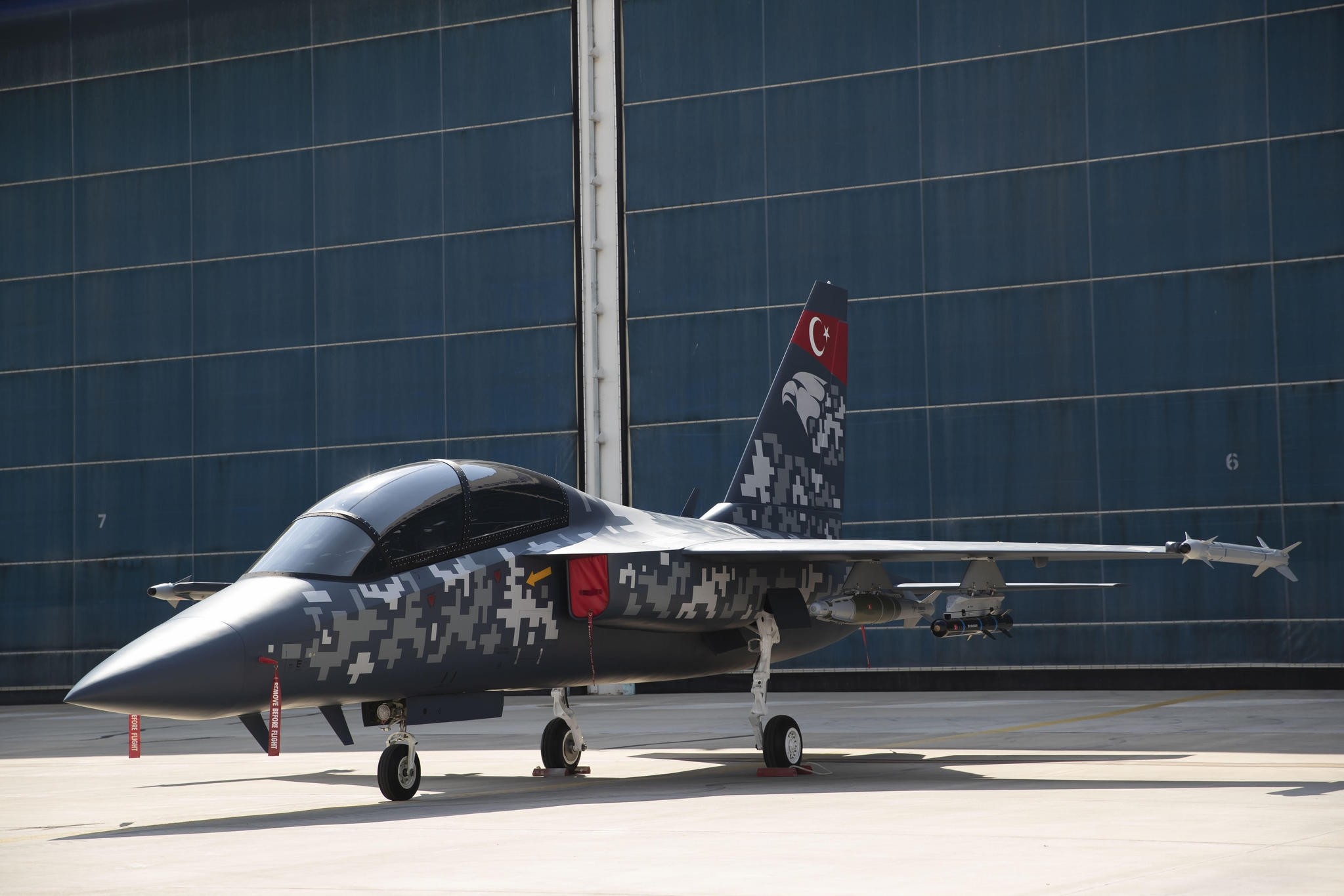
 www.dailysabah.com
www.dailysabah.com
In return any such critical question, remark or doubt is always alone rated an insult and replied in a most aggressive way.
IMO a forum is exactly the place to exchange opinions, even contradicting ones, to ask open questions and to get answers and explanations. If one expects only expects "whao huu ... the best fighter yet to come!" and nothing more, shall leave a discussion.
Son in summary if you look at this program as an outsider we have two side, both as different as they can be:
On the one side - the official one: The TFX/MMU is is a most impressive fighter, a great design and on paper the fighter looks very promising.
On the other side several international analysts and me too have several grave concerns in regard to the overall timeline, budget and especially its engines. This is based on the one side on the "unique social and political situation" in Turkey, which I rate unsecured and even more based on the fact that besides what Turkish sources claim the officially agreed use of F110 engines were so far not announced by either the USA or GE.
This is in strict contrast to any other foreign use of GE engines, be that in India, South Korea and so on and given the latest - to put it mildly - political dispute between the USA and Turkey and the lack of any official US confirmation I am doubtful.
As such my biggest concern are the engines. At least by my understanding (and here I'm open for corrections) it is a fact, that even if a country assembles or manufactures a US engine it cannot simply use it in another product without permission. At least by my understanding, the USA are very strict on this.
So in summary: I would be very much more optimistic if anyone could share not a YouTube-video claiming "it is so" but a credible source telling something about the terms of conditions for GE F110 that Turkey signed. Any bashing down of questions is neither constructive nor helpful.
Even more such nationalistic, stupid claims like "we could even copy it and GE won't even care!" or "if they don't agree, we will go the Russian way!" is not a proof for the agreement to use a TEI built F110. Only the US government - not even GE and surely never TEI - decides on the use of US high end engines. Why alone noting this fact is rated an insult by some is beyond my understanding.
Again, such an agreement is maybe done, but why then does no US source and most of all GE mention this, which is most unusual since GE usually mentioned any use of their engines by a foreign partner?
As such: without any authorisation from the US government, there is NO F110 available for the TFX unless Turkey ignores the US intellectual properties which in return even worse consequences.
Therefore in short: My wish for any discussion on this type would be an honest, open minded and civilised discussion, but without these points of concerns solved (and these are not my concerns alone) all such claims the TFX prototype 01 will be being ready in 2022 and will fly in 2023 is far from assured regardless what some constantly claim.
Anyway, even if the engine issue for the prototypes is solved, there are still mismatches considering the TF-X's development timeline:
(via hhttps://defence.pk/pdf/threads/opinions-on-mmu-huerjet-fighter-trainer-projects.699394/#post-12962208)
1.) First is that of TF-X prototype manufacturing. From Turkish sources I read that 5 prototypes in total are to be manufactured in EMD phase. Of these, 2 are to be powered by F110 (hence the 5 F110 engines Turkey allegedly "already ordered and have been delivered/under deliveries") and the rest of those 3 to be powered by Turkish turbofan engine.
The problem is, the Turks are planning to fly the engine for the first time in 2028. TF-X mass production is planned to be 2029. That means, until just 1 year before mass production, those 3 prototypes with Turkish engines are out there with no engine to fly with. In other words, the Turks should carry out their EMD process with just 2 prototypes which is ridiculous.
2.) Secondly, I've got to remember, that during the first bid for the development of the Turkish engine, where two parties, TEI and TAEC consortium participated, TEI have claimed that they could develop an indigenous engine given 14 years time. IIRC this was during 2019 or something like that. TAEC was chosen in that bid but ultimately the whole bid fell through because RR were done with the Turkish demands for IP rights.
Soon enough TR Motor emerged with TAI's share in it. Considering this and the fact that TEI, a TAI subsidiary, is the only company in Turkey that has sizeable gas turbine engine expertise and know-how, it is reasonable to think that the engineers of TR Motor would probably be TEI engineers.
So when this is the case, how come does TR Motor all the sudden claim that they could develop a turbofan engine for TF-X ready for mass production and application until 2029? That is just 10 years from 2019, 4 years shy of what TEI claimed was the necessary timeline to develop such an engine. Considering the fact that outside parties like GE and RR are still not involved in this program, there seems no factor to exist, that would help Turkey shorten their development timeline for a whopping 4 years.
Apart from all these, the plan to develop a 4.5th generation aircraft, the block 1 aircrafts, by 2029 and further develop a full-blown 5th generation aircraft by 2031, the block 2 aircrafts, is rather questionable. What kind of development plan is it, that a 4.5th generation aircraft becomes a 5th gen aircraft within 2 years time?
Well this at least is just my personal thought unlike the questions above which are based on the information given out by no other than the Turkish officials.
And the same is for the Hürjet ... more questions than answers and a timeline, that is simply unrealistic.

Turkey's Hürjet to make first flight in 2022, first delivery in 2025
Within the scope of the Hürjet project initiated by the Turkish Aerospace Industries (TAI), a protocol has been signed between the company, the Defense...
Last edited:
Yes, Russia as an alternate source seems obvious, but if the stumbling block is tech transfer, I doubt they will offer what Turkey is looking for either. Case in point, there are contentious issues regarding the degree of tech transfer and/or licensed production under the S-400 deal too, AFAIK.
What I meant is that the engine and tech transfer doesn't have to be either/or deal. They get whatever engine (without tech) they can right now, one that can reasonably be replaced with an engine of similar weight/size/class in the next 10 to 15 years. And use that engine, right now, to help the v1.0 variant of their fighter get off the ground as soon as possible. (which may still be 10 years)
During all those years, they try to get various tech transfer deals from whoever they can, so they can one day (in 10 to 15 years?) start making such an engine on their own. Sure, it will probably be a 1990s/2000s tech engine being made in 2030s, but it's better than nothing. It would still power their plane alright and overall the capability leap over their F16s should still be satisfactory, WHILE achieving their goal of self sufficiency in steps.
Bhurki
ACCESS: Secret
- Joined
- 16 July 2020
- Messages
- 345
- Reaction score
- 379
While trying to understand how constituents of TFX will come to be, it'll be shortsighted not to put into context the amount of technical expertise and funding Turkey can bring to bear.
If the current level of technical capabilities can be empirically ascertained, then just following the successive investments over the years into R&D and production infrastructure will provide a good enough bearing on where this program is headed.
Relying solely on miraculous (due to ever changing geopolitics) externalities like another country (UK, Russia) providing core technologies and assessment into the program is a fig leaf. They can, at best, do 'technical studies' due to diplomatic efforts that provide some sense of direction of what needs to be done, but don't expect a handholding assistance, and as such, Turkey will need to do most of what is required on its own.
If the current level of technical capabilities can be empirically ascertained, then just following the successive investments over the years into R&D and production infrastructure will provide a good enough bearing on where this program is headed.
Relying solely on miraculous (due to ever changing geopolitics) externalities like another country (UK, Russia) providing core technologies and assessment into the program is a fig leaf. They can, at best, do 'technical studies' due to diplomatic efforts that provide some sense of direction of what needs to be done, but don't expect a handholding assistance, and as such, Turkey will need to do most of what is required on its own.
Last edited:
I also don't see how the US will rationally justify banning them from using an F110 in their demonstrators given they are part of NATO and that defense resilience is central to NATO interest.
Then any discussions for licence production is another matter that only would have to be debated in no less than a decade...
Then any discussions for licence production is another matter that only would have to be debated in no less than a decade...
what are the options right now?
M88 - Probably unlikely. France and Turkey are on opposing sides in regards to the Med dispute and France is very pro Greece
F414/404 - Unsure. I thought it was the leading candidate but there's been a rift in regards to the S-400 system. not sure if its enough to stop the export of jet engines
EJ200 - assuming its the UK, Italy and Germany that can control its export. UK seems still friendly to Turkey. Italy is on the same side with Turkey on the Med disputes. Germany may oppose
RD-93 - I think the Russians are willing to export, but do the Turks want this engine?
WS-11 and WS-13 - would this be the first time Turkey imports anything from the PRC?
Turkey want a F110 sized engine and a plane that is bigger than F-15 so it would at least need WS-10 or AL-31, which the UK cannot offer as of now.
The point of contention is if Turkey could use the F110s they produce under license, for something that it wasn't originally meant to be used for. The US was very unhappy a few times when their defense products exported to another country were used or handled in a way they were not meant to be used for. I think this is a problem beyond NATO and considering Turkey is under sanctions regardless of being a NATO member for its purchase of S-400s, this could even give a leeway for the US to block Turkey from purchasing parts for their F-16s as a whole.I also don't see how the US will rationally justify banning them from using an F110 in their demonstrators given they are part of NATO and that defense resilience is central to NATO interest.
Then any discussions for licence production is another matter that only would have to be debated in no less than a decade...
Apart from all these, they need a suitable FADEC for TF-X if they want to use F110s for it, which currently doesn't seem to be the case.
To be honest, the only case of transfer of technology concerning gas turbine core which I could think of that happened during the last 4 decades is when the US transferred F110 technology to Japan during FSX, soon F-2.Yes, Russia as an alternate source seems obvious, but if the stumbling block is tech transfer, I doubt they will offer what Turkey is looking for either. Case in point, there are contentious issues regarding the degree of tech transfer and/or licensed production under the S-400 deal too, AFAIK.
What I meant is that the engine and tech transfer doesn't have to be either/or deal. They get whatever engine (without tech) they can right now, one that can reasonably be replaced with an engine of similar weight/size/class in the next 10 to 15 years. And use that engine, right now, to help the v1.0 variant of their fighter get off the ground as soon as possible. (which may still be 10 years)
During all those years, they try to get various tech transfer deals from whoever they can, so they can one day (in 10 to 15 years?) start making such an engine on their own. Sure, it will probably be a 1990s/2000s tech engine being made in 2030s, but it's better than nothing. It would still power their plane alright and overall the capability leap over their F16s should still be satisfactory, WHILE achieving their goal of self sufficiency in steps.

Senate Fails to Override Bush on FSX Plane
President Bush narrowly won his battle with Congress on Wednesday over the controversial U.S. deal with Japan for joint development of the FSX jet fighter plane, clearing the way for the two sides to begin work on the aircraft after nine months of delay.
And this was for the joint development + transfer of Japanese technology including composite structure and airborne AESA technology to the US. So it was more of a bilateral exchange. Even then it was met with a strong opposition just like how its described in the article.
So unless Turkey's got a technology they could offer to these countries, which isn't the case, I don't see any possibility in which any country would be interested in sellin gas turbine core tech.
They are not completely blank concerning avionics tech, just like how they plan to replace MC, radar and few other components of their F-16 block 30 with their own AESA and MC in özgür program.While trying to understand how constituents of TFX will come to be, it'll be shortsighted not to put into context the amount of technical expertise and funding Turkey can bring to bear.
If the current level of technical capabilities can be empirically ascertained, then just following the successive investments over the years into R&D and production infrastructure will provide a good enough bearing on where this program is headed.
Relying solely on miraculous (due to ever changing geopolitics) externalities like another country (UK, Russia) providing core technologies and assessment into the program is a fig leaf. They can, at best, do 'technical studies' due to diplomatic efforts that provide some sense of direction of what needs to be done, but don't expect a handholding assistance, and as such, Turkey will need to do most of what is required on its own.
Problem is, there's nothing known anything beyond that, especially considering they are claiming that their jet will be "5th gen". Passive conformal sensors, data fusion engine, sophisticated data link, frequency selective or absorbing materials and structures are to name a few necessary technology that comes into my mind, all of which Turkey hasn't showcased of. So I would still doubt this plane, even when it flies with their own engine and radar, to be 5th gen, let alone 4.5th gen.
What I meant is that the engine and tech transfer doesn't have to be either/or deal. They get whatever engine (without tech) they can right now, one that can reasonably be replaced with an engine of similar weight/size/class in the next 10 to 15 years. And use that engine, right now, to help the v1.0 variant of their fighter get off the ground as soon as possible. (which may still be 10 years)
Well, if you drop the requirement for tech transfer there is no more reason to look anywhere other than the UK offer. EJ200 has a development road map out to 120kN (formerly known as EJ230) which is probably exactly what RR offered, albeit without the degree of localization desired by Turkey. So if tech transfer was a sticking point serious enough to end the UK partnership, turning to Russia is not going to solve this problem.
In other words, the model you propose could work just fine with a RR-supplied thrust-augmented EJ200, though it might be a bit more expensive than buying Izd.117S off the shelf. The political cost on the other hand...
Last edited:
- Joined
- 9 October 2009
- Messages
- 20,775
- Reaction score
- 11,723
Politicians / bureaucrats and rationality are often nodding acquaintances at best.
The requirement for tech transfer would still NEED to be there, only not right away, not necessarily tied with the engine purchase. Thing is - it should be easier for Turkey to get tech transfer if:What I meant is that the engine and tech transfer doesn't have to be either/or deal. They get whatever engine (without tech) they can right now, one that can reasonably be replaced with an engine of similar weight/size/class in the next 10 to 15 years. And use that engine, right now, to help the v1.0 variant of their fighter get off the ground as soon as possible. (which may still be 10 years)
Well, if you drop the requirement for tech transfer there is no more reason to look anywhere other than the UK offer. EJ200 has a development road map out to 120kN (formerly known as EJ230) which is probably exactly what RR offered, albeit without the degree of localization desired by Turkey. So if tech transfer was a sticking point serious enough to end the UK partnership, turning to Russia is not going to solve this problem.
In other words, the model you propose could work just fine with a RR-supplied thrust-augmented EJ200, though it might be a bit more expensive than buying Izd.117S off the shelf. The political cost on the other hand...
A) the engine tech is not very advanced
B) the engine tech does not come from US/UK
Also, long term compatibility would need to be taken into account. If Turkey does get to buy off the shelf EJ200 - and then gets tech transfer from Russia or China - it might be quite hard to re-design the whole plane to accept different engines.
On the other hand, The Chinese WS13 is allegedly modeled to be interchangeable with Russian RD93. So any of those two engines might work. If Turkey can get off the shelf engines of either of those two makes now and then tech transfer in 10 years time, the overall conversion process would be much more seamless.
Downside is, of course, that those engines are not advanced, but if the other options like EJ200 are politically unavailable (as tech transfers) then there's there's just one course of action anyway. And technological independence is likely much more important for Turkey than having a generation newer engine in their TFX fighter.
- Joined
- 2 January 2006
- Messages
- 3,585
- Reaction score
- 3,454
I must admit, after reading the last posts I'm again even more concerned since a lot of speculations were mentioned - ranging from a Russian engine, a Eurojet EJ230 or similar ... - but from all I know, TAI is still claiming to roll out a prototype in March 2023. As such isn't it most urgent to have a final decision, to finalise the design and start preparing construction?
If the decision is still not being made on a F110 - which I took for granted - any change again to another European design or a Russian one would require a much wider redesign and as such even further delay the project.
But again, no answer from our Turkish friends ...
If the decision is still not being made on a F110 - which I took for granted - any change again to another European design or a Russian one would require a much wider redesign and as such even further delay the project.
But again, no answer from our Turkish friends ...
The requirement for tech transfer would still NEED to be there, only not right away, not necessarily tied with the engine purchase. Thing is - it should be easier for Turkey to get tech transfer if:
A) the engine tech is not very advanced
B) the engine tech does not come from US/UK
Concur with A), but I don't think B) applies (which was my point). If Turkey insists on transfer of advanced engine tech, B) won't help because non-Western players will guard their IP just as jealously. If it is prepared to accept A) however, why not reverse-engineer the F110, for which substantial know how is available locally?
Turning to a different engine in the same class (WS-10, Saturn or Salyut AL-31F derivative) involves basically starting from scratch, albeit with the benefit of OEM consent. Based on precedent I'm not so sure the latter is an absolute prerequisite though, I could see the US tolerating an unofficial copy of an outdated engine. Certainly, it's not at all clear that the political fallout if any would be worse than the consequences of once more buying Russian or Chinese. Consider that quite a number of Turkey's advanced munitions projects (their SDB knock-off, the GÖKTUG AAMs) are thinly-veiled clones of their US counterparts, with nary a complaint. Or, for that matter (and perhaps even more poignantly), the TS1400 turboshaft and its resemblance to the LHTEC T800...
They may not endorse it, but apparently they can live with such an arrangement if it serves to keep Turkey from gravitating further toward Russia and China.
Last edited:
- Joined
- 2 January 2006
- Messages
- 3,585
- Reaction score
- 3,454
The requirement for tech transfer would still NEED to be there, only not right away, not necessarily tied with the engine purchase. Thing is - it should be easier for Turkey to get tech transfer if:What I meant is that the engine and tech transfer doesn't have to be either/or deal. They get whatever engine (without tech) they can right now, one that can reasonably be replaced with an engine of similar weight/size/class in the next 10 to 15 years. And use that engine, right now, to help the v1.0 variant of their fighter get off the ground as soon as possible. (which may still be 10 years)
Well, if you drop the requirement for tech transfer there is no more reason to look anywhere other than the UK offer. EJ200 has a development road map out to 120kN (formerly known as EJ230) which is probably exactly what RR offered, albeit without the degree of localization desired by Turkey. So if tech transfer was a sticking point serious enough to end the UK partnership, turning to Russia is not going to solve this problem.
In other words, the model you propose could work just fine with a RR-supplied thrust-augmented EJ200, though it might be a bit more expensive than buying Izd.117S off the shelf. The political cost on the other hand...
A) the engine tech is not very advanced
B) the engine tech does not come from US/UK
Also, long term compatibility would need to be taken into account. If Turkey does get to buy off the shelf EJ200 - and then gets tech transfer from Russia or China - it might be quite hard to re-design the whole plane to accept different engines.
On the other hand, The Chinese WS13 is allegedly modeled to be interchangeable with Russian RD93. So any of those two engines might work. If Turkey can get off the shelf engines of either of those two makes now and then tech transfer in 10 years time, the overall conversion process would be much more seamless.
Downside is, of course, that those engines are not advanced, but if the other options like EJ200 are politically unavailable (as tech transfers) then there's there's just one course of action anyway. And technological independence is likely much more important for Turkey than having a generation newer engine in their TFX fighter.
But please correct me if I'm wrong: By all I know about the TFX, it is aimed to be a fighter larger/heavier than a F-15 or broadly comparable to a Raptor. As such any engine below a F110 - and IMO even this is not powerful enough - like a EJ200, an F414, M88, RD-93 or WS-13 is anyway irrelevant. Or are you discussing an engine for the Hürjet?
If Turkey insists on transfer of advanced engine tech, B) won't help because non-Western players will guard their IP just as jealously. If it is prepared to accept A) however, why not reverse-engineer the F110, for which substantial know how is available locally?
Well, we disagree there. While all countries usually guard their secrets, I do think there ARE differences. The older the engine tech is - the greater chances there are that a high-enough sum of money will indeed buy tech transfer. For example, if there wasn't the issue of politics, RR might gladly sell RB199 tech to Turkey. (providing such engine class even works for Turkey). But since there ARE political frictions abound when it comes to military cooperation of other NATO countries and Turkey - such deals may still fall through.
On the other hand, as you yourself said, China and Russia do have a vested interest in pulling Turkey closer to them. So in light of that, a decision could be made to sacrifice a bit of technological edge by selling previous generation engine tech. If that'll help seal the deal.
Turkey seems to be gravitating towards F110 simply because it's the only thing they have access to right now. But they have to size up the design of the plane so it suits the engines. And if F110 turns out to be an illegal solution, sure it could power up some prototypes - but then what? Turkey needs hundreds of engines produced.
While F110 is claimed to be made in Turkey - how do we know just how much of it is actually made by Turkey? Is it final assembly? Or production of all parts? There could very well be subsystems that Turkey would be lacking. https://asmedigitalcollection.asme....V002T02A020/2397636/v002t02a020-88-gt-305.pdf
Here it says, for example, that Volvo produced 35% of parts for RM12, while General Electric produced 65%. Even though it's usually claimed Volvo got the license for RM12, it apparently is far from a 100% license and full tech transfer. So I will allow myself to be sceptical of actual license that Turkey has to produce f110 completely on their own. In my opinion, there's a high chance they want to use ready made F110 just to power the prototypes. Despite what the US might say to that. But they may not have the means to produce further F110 in large numbers to power a whole future fleet of TFX fighters.
And if they tried completely reverse engineering F110 from scratch - well that's quite problematic. China tried it, and it took them basically 30 years to pull it off, with WS10 being the final result, mating all sort of technology in one final design. How long it might take Turkey is anyone's guess, depending on just how much they already know about F110, but it's still plausible we're talking a decade or two.
Of course, if the West does want to entice Turkey to keep away from Russia/China by dangling engine tech in front of it -that could work. But if that was SO important to the West, then none of the F-35 fiasco would have happened.
TFX is, as far as I can tell, a very undefined project still. It started off as a medium class fighter. The fact they sought 90 kn thrust EJ200 shows as much. But since the F110 is the best thing Turkey can hope for at this moment, that may have pushed them to revise the design. Some sources still mention the 27 ton MTOW specification. If that IS true, then it's still a medium class plane somewhat. Of course, that may be just an old figure, back when EJ200 was in play. Interestingly, Avic's FC-31 MTOW figure was 28 tons. For a plane with two 90-100 kn engines.But please correct me if I'm wrong: By all I know about the TFX, it is aimed to be a fighter larger/heavier than a F-15 or broadly comparable to a Raptor. As such any engine below a F110 - and IMO even this is not powerful enough - like a EJ200, an F414, M88, RD-93 or WS-13 is anyway irrelevant. Or are you discussing an engine for the Hürjet?
I do believe TFX data will be changing in the future, as new developments on the engine front happen. Or, indeed, if they try to make it work with F110, then the plane will indeed be in the F-15 class.
But I wouldn't hold my breath waiting for it to really fly, let alone enter service. Way too much uncertainty right now.
On the other hand, as you yourself said, China and Russia do have a vested interest in pulling Turkey closer to them. So in light of that, a decision could be made to sacrifice a bit of technological edge by selling previous generation engine tech. If that'll help seal the deal.
Possible, but that didn't compel Russia to grant Turkey the kind of access to S-400 technology that it sought. Despite, as with jet engines, the next generation lurking in the wings, in the shape of the S-500.
And if they tried completely reverse engineering F110 from scratch - well that's quite problematic. China tried it, and it took them basically 30 years to pull it off, with WS10 being the final result, mating all sort of technology in one final design.
China was completely on its own though. I'm thinking tacit tolerance by the US of a Turkish 120kN engine project called TF120 or somesuch, with no acknowledged relation (by either side) but suspiciously similar architecture to the F110
How long it might take Turkey is anyone's guess, depending on just how much they already know about F110, but it's still plausible we're talking a decade or two.
Absolutely! Exactly the same as all the alternatives
red admiral
ACCESS: Top Secret
- Joined
- 16 September 2006
- Messages
- 1,574
- Reaction score
- 1,784
If more thrust is needed then just use three enginesBut please correct me if I'm wrong: By all I know about the TFX, it is aimed to be a fighter larger/heavier than a F-15 or broadly comparable to a Raptor. As such any engine below a F110 - and IMO even this is not powerful enough - like a EJ200, an F414, M88, RD-93 or WS-13 is anyway irrelevant.
Its as realistic as some of the other options
- Joined
- 2 January 2006
- Messages
- 3,585
- Reaction score
- 3,454
If more thrust is needed then just use three enginesBut please correct me if I'm wrong: By all I know about the TFX, it is aimed to be a fighter larger/heavier than a F-15 or broadly comparable to a Raptor. As such any engine below a F110 - and IMO even this is not powerful enough - like a EJ200, an F414, M88, RD-93 or WS-13 is anyway irrelevant.
Its as realistic as some of the other options
Great idea, so they can hype another first.
Bhurki
ACCESS: Secret
- Joined
- 16 July 2020
- Messages
- 345
- Reaction score
- 379
Expect an IP infringement strike by Turbokat.If more thrust is needed then just use three enginesBut please correct me if I'm wrong: By all I know about the TFX, it is aimed to be a fighter larger/heavier than a F-15 or broadly comparable to a Raptor. As such any engine below a F110 - and IMO even this is not powerful enough - like a EJ200, an F414, M88, RD-93 or WS-13 is anyway irrelevant.
Its as realistic as some of the other options
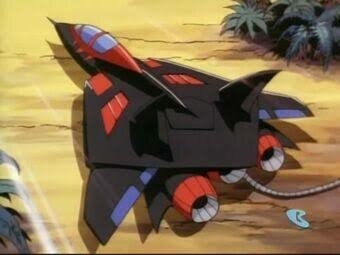
Combat-Master
ACCESS: Top Secret
- Joined
- 15 July 2020
- Messages
- 1,195
- Reaction score
- 3,300
In the meantime, Tubitak MAM of Turkey delivered first set of single crystal turbine blades to TEI who will further machine the blades into end products for the Turkish 1400shp gas turbine engine. Engine manufacturer TEI claims that the technology and know-how accumulated during the development of gas turbine would be transferred into the development of Turkish F110 type engine..
These blades are for engine number 5 of TS1400.


These blades are for engine number 5 of TS1400.
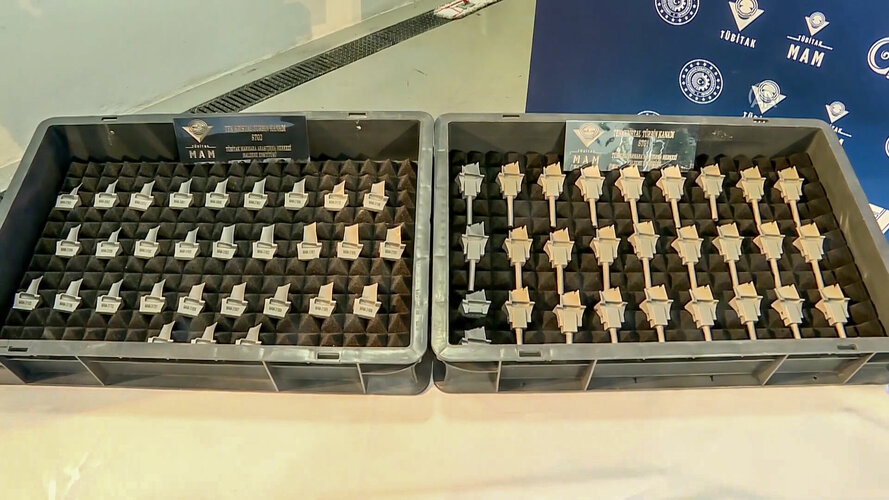
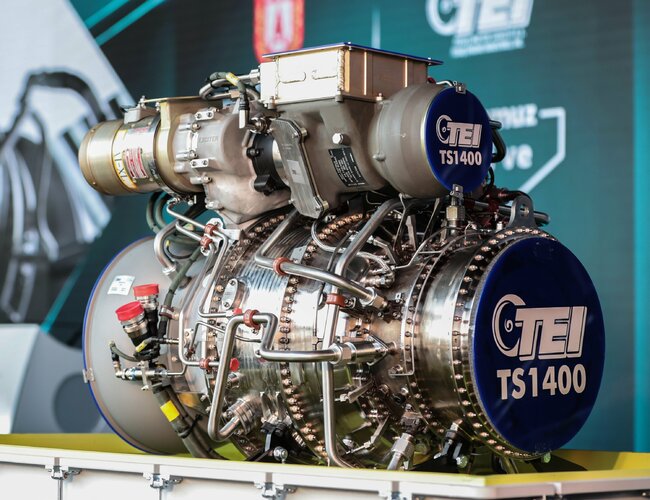
Last edited:
Combat-Master
ACCESS: Top Secret
- Joined
- 15 July 2020
- Messages
- 1,195
- Reaction score
- 3,300
If Turkey insists on transfer of advanced engine tech, B) won't help because non-Western players will guard their IP just as jealously. If it is prepared to accept A) however, why not reverse-engineer the F110, for which substantial know how is available locally?
While F110 is claimed to be made in Turkey - how do we know just how much of it is actually made by Turkey? Is it final assembly? Or production of all parts? There could very well be subsystems that Turkey would be lacking. https://asmedigitalcollection.asme....V002T02A020/2397636/v002t02a020-88-gt-305.pdf
This issue was brought up in a recent interview with TEI General Manager, he pulled up a chart which showed areas in which Turkey had to work on to gain technological knowhow on - the studies and initiatives to gain the technology started in 2014 and completed with the red dots shown in the illustration of a Turbofan jet engine. Illustration claims all knowhow on critical parts of a turbofan engine were accumulated by september of 2017
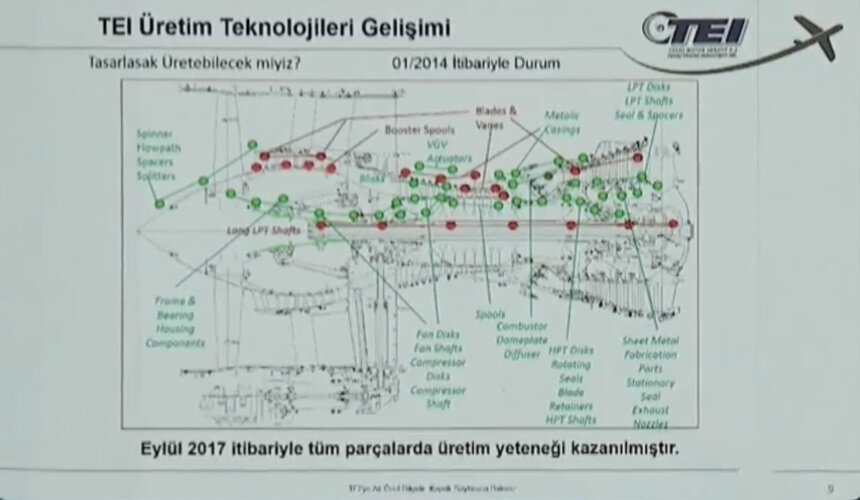
I'd also like to add that Turkey and Ukraine are working closely together to develop new generation of Gas Turbine engines for ship propulsion - we may see this expand to aerospace.
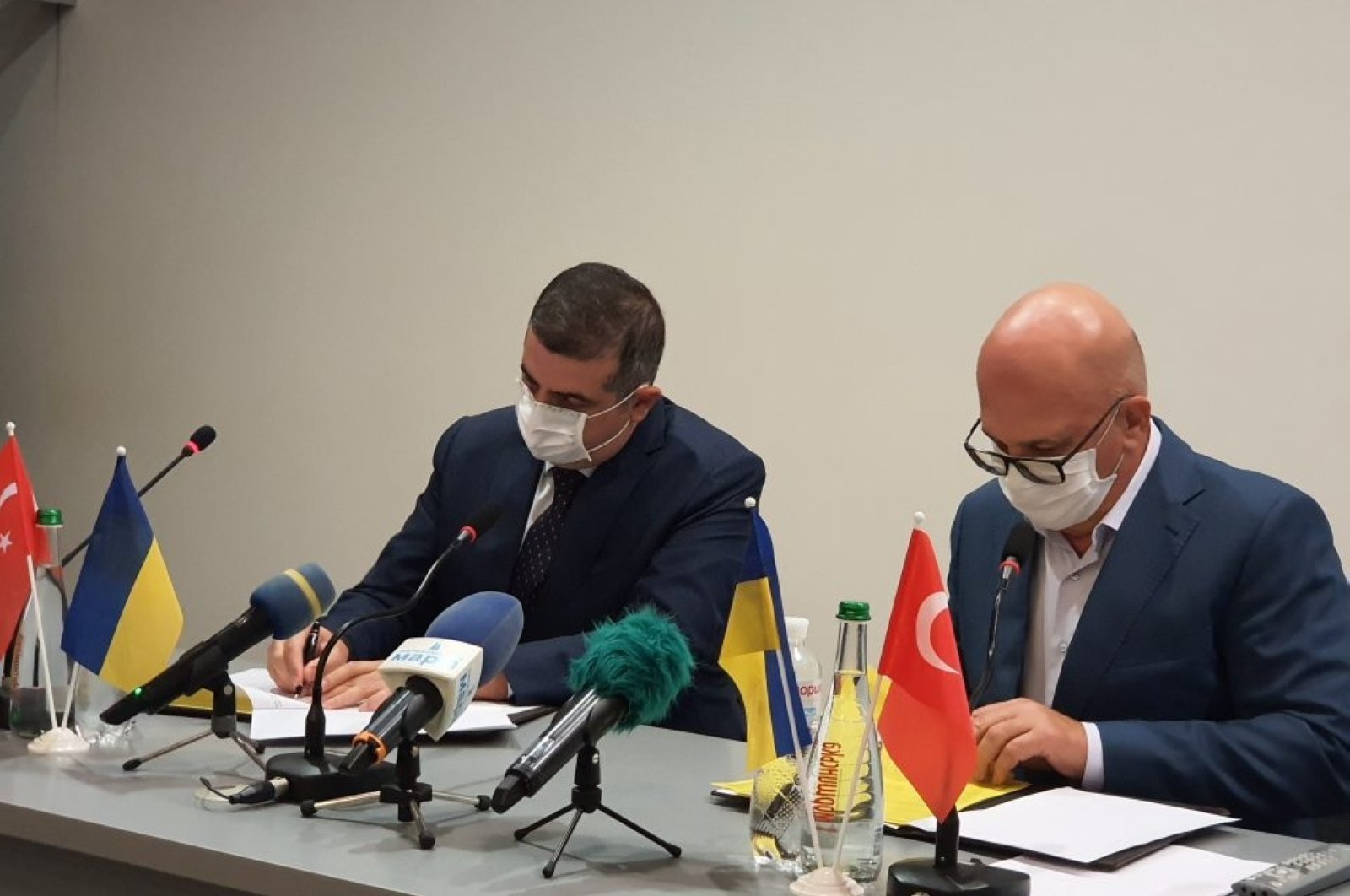
Turkish, Ukrainian firms ink defense deal
Turkish energy firm LODOS Propulsion signed a defense deal with Ukrainian gas turbine producer Zorya-Mashproekt, owned by the Ukrainian state-run defense...
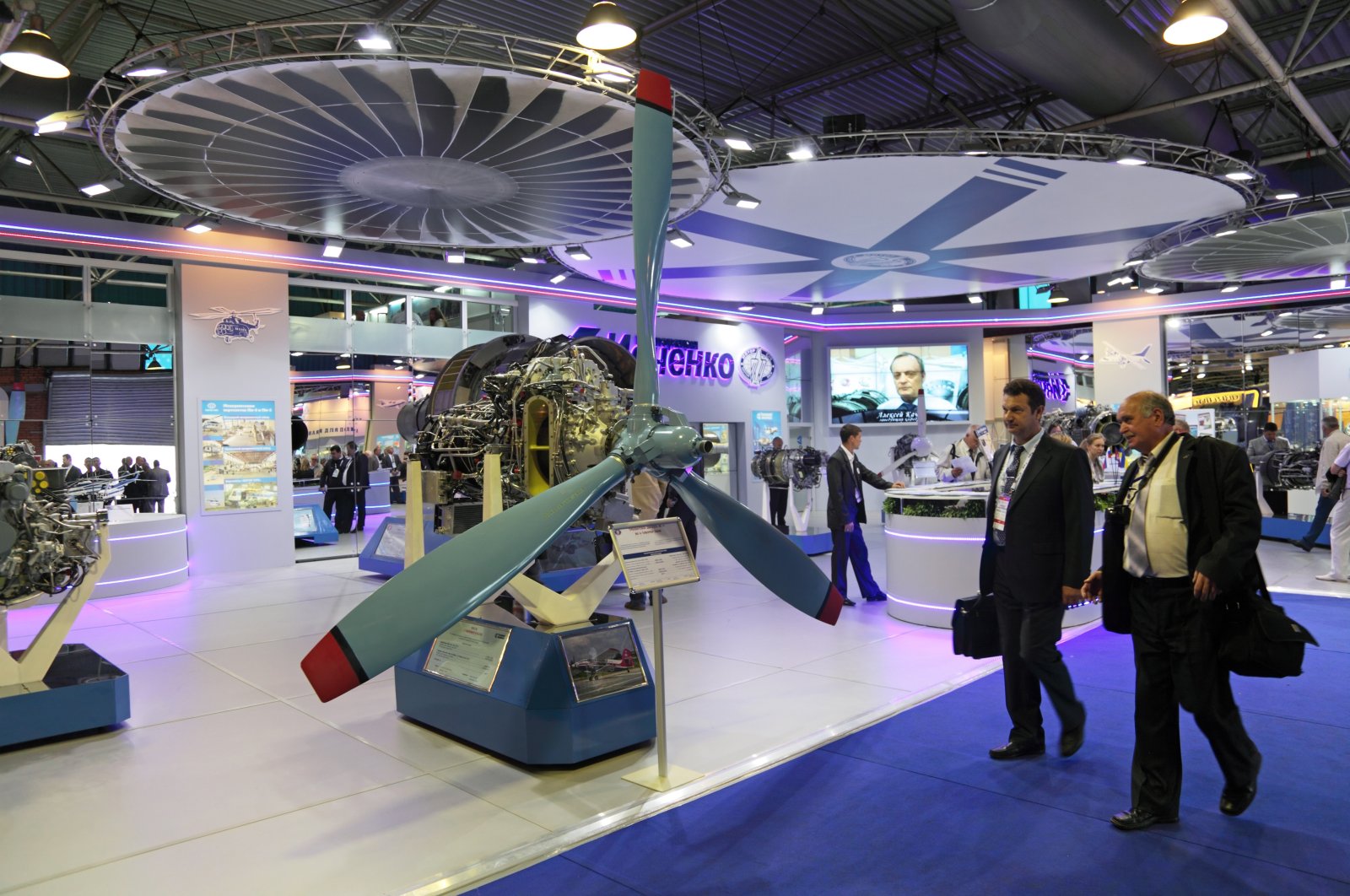
Ukraine to supply engine for Turkey’s next-gen cruise missile: local media
Contracts have been signed between a Ukrainian engine developer, Ivchenko-Progress, and several suppliers for parts of the AI-35 engines that are expected...
Last edited:
Thanks for that chart. So, taking that at face value, by 2017 TEI was missing technology on:
Fan blades
High pressure compressor blades
Low pressure compressor blades
Vanes (also throughout the engine?)
Booster spools
Turbine blades
There's also the red dots throughout the central line of the engine. Not sure what those refer to. There is a line mentioning long low pressure turbine shafts, but it's unclear if the red dots are referring to that shaft.
Fan blades
High pressure compressor blades
Low pressure compressor blades
Vanes (also throughout the engine?)
Booster spools
Turbine blades
There's also the red dots throughout the central line of the engine. Not sure what those refer to. There is a line mentioning long low pressure turbine shafts, but it's unclear if the red dots are referring to that shaft.
Combat-Master
ACCESS: Top Secret
- Joined
- 15 July 2020
- Messages
- 1,195
- Reaction score
- 3,300
Thanks for that chart. So, taking that at face value, by 2017 TEI was missing technology on:
Fan blades
High pressure compressor blades
Low pressure compressor blades
Vanes (also throughout the engine?)
Booster spools
Turbine blades
There's also the red dots throughout the central line of the engine. Not sure what those refer to. There is a line mentioning long low pressure turbine shafts, but it's unclear if the red dots are referring to that shaft.
No the feasibility studies started in 2014 those were the missing production technologies and know-how. By 2017 production capabilities / knowhow was gained, according to the presentation slide. The slide isn't clear enough to make out some of the missing production technologies, but I believe those you have written down were some of the areas where Turkey did not have capabilities in.
If Turkey insists on transfer of advanced engine tech, B) won't help because non-Western players will guard their IP just as jealously. If it is prepared to accept A) however, why not reverse-engineer the F110, for which substantial know how is available locally?
While F110 is claimed to be made in Turkey - how do we know just how much of it is actually made by Turkey? Is it final assembly? Or production of all parts? There could very well be subsystems that Turkey would be lacking. https://asmedigitalcollection.asme....V002T02A020/2397636/v002t02a020-88-gt-305.pdf
This issue was brought up in a recent interview with TEI General Manager, he pulled up a chart which showed areas in which Turkey had to work on to gain technological knowhow on - the studies and initiatives to gain the technology started in 2014 and completed with the red dots shown in the illustration of a Turbofan jet engine. Illustration claims all knowhow on critical parts of a turbofan engine were accumulated by september of 2017
View attachment 651131
I'd also like to add that Turkey and Ukraine are working closely together to develop new generation of Gas Turbine engines for ship propulsion - we may see this expand to aerospace.

Turkish, Ukrainian firms ink defense deal
Turkish energy firm LODOS Propulsion signed a defense deal with Ukrainian gas turbine producer Zorya-Mashproekt, owned by the Ukrainian state-run defense...www.dailysabah.com

Ukraine to supply engine for Turkey’s next-gen cruise missile: local media
Contracts have been signed between a Ukrainian engine developer, Ivchenko-Progress, and several suppliers for parts of the AI-35 engines that are expected...www.dailysabah.com
There have been a few cases where a turboshaft engine's core has been developed into a turbofan derivative. In all of those cases the original turbofan engine had a way higher power output compared to that of TEI TS-1400.
The older T55 variants for example had an output between 2,200~3,700 hp, from which the ALF502 was developed that has a 6,700 ~ 7,500 Ibf thrust.
T406 for the Osprey has an output of around 6,000 hp and the AE 3007 which uses the derivative core has a thrust between 7,000 Ibf to 9,500 Ibf.
T407 also had around 6,000 hp output and has been developed into CFE738 turbofan which has 5,900 Ibf thrust.
All of these turbofan engines have a bypass ratio between 5 ~ 6 to 1, so that should be taken into consideration when talking about the equivalent technology Turkey possesses for developing a turbofan engine because what they want is an engine with even lower bypass ratio than that.
What's really important isn't if they do have the technology, which is quantitative but rather if that technology is on a high enough level to be used to develop a turbofan engine they demand (F110 class) which is qualitative. From this perspective, when talking about gas turbine technology, one of the most representative figure is the turbine inlet temperature and as long as I know the Turks haven't specified for which temperature those technologies are suitable for.
Taking another example, which is Japan's gas turbine engine development history, the first aviation jet engine Japan has developed post-war was the J3 which had been developed since 1955. Then they continued to F3 and FJR710 of the 1970s and subsequently the XF5 and F7 of the 90s and XF9 of 2010s. Overall it took Japan around 20 years since the completion of F3, which had 2,650 Ibf (mil) of thrust and 940 ºc turbine inlet temperature till the completion of F3-400, which had 4,360 Ibf (mil) of thrust and 1,400ºc turbine inlet temperature.
To make it easier to comprehend, earlier GE F110 variants for Tomcat and Falcon had around 1,400ºc to 1,500ºc TIT.
I would not be so confident to believe if anyone claims that Turkey has an engine with TIT of over 1,400 ºc and that figure already is very generous.
Last edited:
Don't forget that CAE is among us (CAD/CFD). There is also undoubtedly some untold or secretive cooperation here and there.
So it won't take them 40 years. A decade is a reasonable time-line.
Remember that they are not targeting 21st century turbine Inn ovation but late 20ths.
So it won't take them 40 years. A decade is a reasonable time-line.
Remember that they are not targeting 21st century turbine Inn ovation but late 20ths.
Woopsie, that's a typo. I meant 20 years. 20 years because it was still an iteration of the F3. It took them 24 years after that to go from 1,400ºc to 1,600ºc of XF5.Don't forget that CAE is among us (CAD/CFD). There is also undoubtedly some untold or secretive cooperation here and there.
So it won't take them 40 years. A decade is a reasonable time-line.
Remember that they are not targeting 21st century turbine Inn ovation but late 20ths.
Well, CAE surely does help but designing an engine with higher TIT is more than just the structure of the the turbine itself, as you would know. Developing a material durable enough at those temperatures and methods to mass-produce isn't where someone could use CAE for much help. I do suspect that Turkey would be getting or will be able to get some help from Ukraine but they could only help just so much. Also we've got to remember that TAI, SSB, TEI and other Turkish officials have repeatedly and openly claimed that they are going to make TF-X fly on supercruise.
Tbh it's all meaningless unless they make public of the TIT of their TS-1400 engine. Even achieving that late 20th century tech, 1,500ºc TIT, ain't going to be that easy unless they already have the technology to develop something with TIT higher than 1,400ºc in hand.
All in all we are talking about afterburning turbofan not turboshaft which is another kind of challenge they are facing. I've only used TIT because its one of the most representative quality to judge about one's gas turbine technology but there are important technologies apart from just turbine section related ones you need in order to develop an engine in the class of F110.
Last edited:
Combat-Master
ACCESS: Top Secret
- Joined
- 15 July 2020
- Messages
- 1,195
- Reaction score
- 3,300
This is what TEI produces of the GE F110 engine, full engine assembly does take place at TEI of F110.

HPTR (High Pressure Turbine Rotor)
LPT Rotor
LPT Stage 1 Nozzle
LPT Stage 2 Nozzle
Turbine Frame
Bell Crank
Accessory Gearbox
Outer Duct
Exhaust Nozzle
Augmentor
TJ300- Turbojet engine 24cm diameter, weighs 30kg with a 1300n of Thrust (Anti-Ship missile engine)
View: https://www.youtube.com/watch?v=gVH-qQvr03E
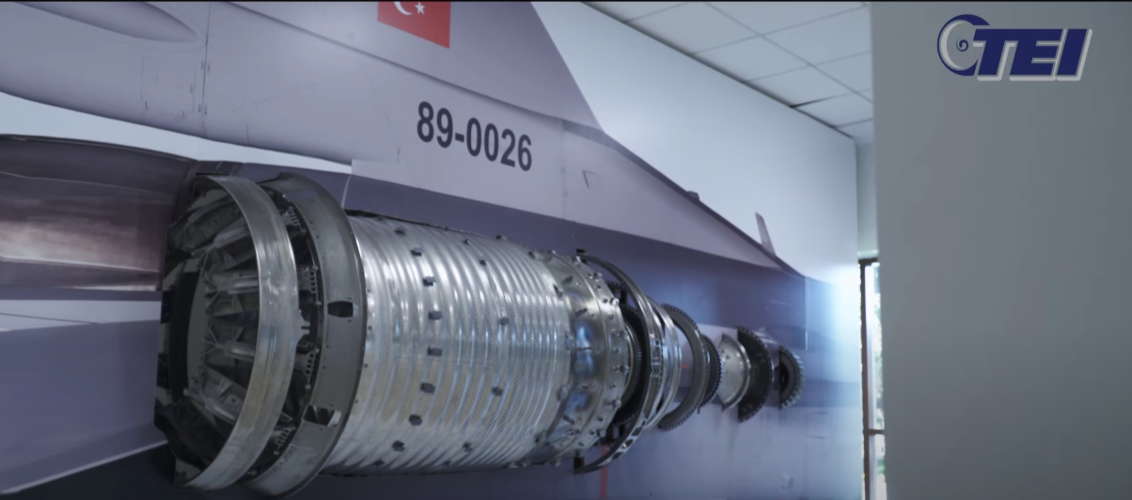
HPTR (High Pressure Turbine Rotor)
LPT Rotor
LPT Stage 1 Nozzle
LPT Stage 2 Nozzle
Turbine Frame
Bell Crank
Accessory Gearbox
Outer Duct
Exhaust Nozzle
Augmentor
TJ300- Turbojet engine 24cm diameter, weighs 30kg with a 1300n of Thrust (Anti-Ship missile engine)
Last edited:
Bhurki
ACCESS: Secret
- Joined
- 16 July 2020
- Messages
- 345
- Reaction score
- 379
And then there's F135 burning the first turbine blade at 2000°C.I would not be so confident to believe if anyone claims that Turkey has an engine with TIT of over 1,400 ºc and that figure already is very generous.
Combat-Master
ACCESS: Top Secret
- Joined
- 15 July 2020
- Messages
- 1,195
- Reaction score
- 3,300
The Single Crystal Nickel Superalloy Tubitak MAM produced for TS1400 is stated to reach temperatures of 1400c
It's in Turkish unfortunately but he states it as so
View: https://youtu.be/KB96XewfPQ8?t=648

It's in Turkish unfortunately but he states it as so
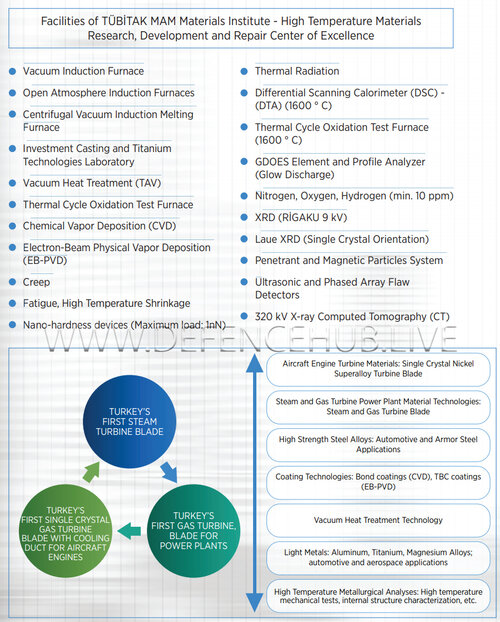
Last edited:
This at least is encouraging that they already have the infrastructure to develop a F110-GE-129 class engine they are aiming for. Well, in fact the reason we doubt this engine program is because of its timeline (production ready by 2029), not because Turkey lacks the infrastructure or anything alike.
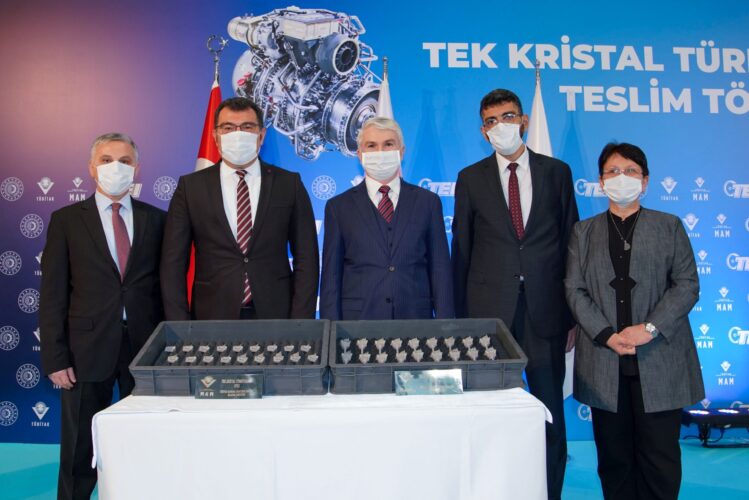
TEI'ye TS1400 için kritik parça teslimi | SavunmaSanayiST
TÜBİTAK MAM, KRİTSTAL Projesi kapsamında TEI'ye türbin kanatçıklarının teslimatını gerçekleştirildi. Parçalar, TEI-TS1400’ün TS5 numaralı motorunda kullanılacak
 www.savunmasanayist.com
www.savunmasanayist.com
I did find out an article which mentions the turbine temperature. I would still refrain from completely believing it because its not an official document from TEI or Turkish army but granted this article is indeed true, it says that the turbine blades could operate at a temperature up to 1,400 ºc which would mean that the TIT of TS1400 would be somewhere in the region of 1,300 ºc ~ 1,400 ºc. Not far off from what I mentioned as a maximum figure I'm expecting.
(edit) Just found out that the TIT of GE-129 ain't that different to that of GE-100 or GE-400. On the flipside that shows that there are other important factors than just the raw TIT figures that determines turbofan performance, just like what I've said above. Things like OPR for example.
Last but not least, once again its not the question of if Turkey could do it. Surely they could given enough time, but it would be extremely hard - to put it softly - to achieve that in the projected timeline.
Last edited:
Yes that surely is something, although there are some opinions that say it should actually be 3,200°F not 3,600°F, doubting the figures from Langston's article. Very interesting subject to discuss about but its unfortunately OT.And then there's F135 burning the first turbine blade at 2000°C.I would not be so confident to believe if anyone claims that Turkey has an engine with TIT of over 1,400 ºc and that figure already is very generous.
Combat-Master
ACCESS: Top Secret
- Joined
- 15 July 2020
- Messages
- 1,195
- Reaction score
- 3,300
TAI and ITU-AI will co-operate in developing AI for TFX and future unmanned aircrafts
View: https://twitter.com/itu_ai_research/status/1362636711709331456?s=20
View: https://twitter.com/itu_ai_research/status/1362636711709331456?s=20
Okay, so bottom line conclusion is that Turkey has had more tech transfer on engines than Sweden?
So it'd take them less to develop a home grown iteration of F110 than it did the Chinese for F101/CFM56?
They'd still likely want a smaller, less powerful but more modern tech to power their jet though. Sizing up the TFX to a F15 weight class design is likely not what they ideally had in mind.
So it'd take them less to develop a home grown iteration of F110 than it did the Chinese for F101/CFM56?
They'd still likely want a smaller, less powerful but more modern tech to power their jet though. Sizing up the TFX to a F15 weight class design is likely not what they ideally had in mind.
Similar threads
-
-
Combat use of F-16s in Mideast spurs fresh demand: Lockheed
- Started by Triton
- Replies: 1
-
-
Advancements and Deployment of Turkish UAVs: A Strategic Overview
- Started by Combat-Master
- Replies: 944
-
Turkey in missile talks with France after China SAM deal falters
- Started by Grey Havoc
- Replies: 0
